The COVID-19 outbreak worldwide is affecting not just crime as I explained last week, but also law enforcement: How are police responding to COVID-19 and its knock-on effects on crime? What effects does the pandemic have on criminal groups and the policing they do?
Where have all the coppers gone?
Globally, police forces are predominantly located in cities, since places with high concentrations of people are frequent crime locations. In some cities, police are concentrated in crime hotspots. In large parts of the world, however, they predominantly service upper-class and middle-class neighborhoods.
The worldwide COVID-19 lockdowns are likely to trigger significant, if temporary, changes in patrol allocations, as police and supplementary forces are called upon to ensure that residents do not violate stay-at-home ordinances. In particular, police and other law enforcement forces are likely to be redeployed to cities from rural areas, further slimming policing there.
In Italy, the Carabinieri, normally tasked principally with patrolling rural spaces, have been sent to cities to patrol shops and cafes to during the COVID-19 lockdown. In Spain, the government has deployed the military for similar quarantine enforcement. In large parts of Africa and Central America, the militaries may also be called upon, as they were during the 2013 Ebola outbreak in West Africa. The United States is considering mobilizing the national guard, as police forces and other first responders become infected with COVID-19.
The policing redeployment to cities will leave rural areas vulnerable to crimes of opportunity and crimes of desperation. The exact manifestations of rural criminality will differ in different regions of the world. In parts of Africa and Asia, it is likely to exacerbate poaching — both for personal subsistence consumption, as COVID-19 significantly compounds economic immiseration, and in preparation for a future surge of international wildlife trafficking. As I discuss in my book The Extinction Market, many of the poorest people in rural areas depend on wildlife consumption for basic subsistence, even as such consumption enables the emergence of zoogenic diseases. Unfortunately and terrifyingly, COVID-19 is unlikely to result in robust and lasting measures to suppress poaching and wildlife trafficking to avoid another pandemic.
A global recession may also exacerbate preexisting and intensifying rural crime and conflict, such as between farmers and herders that is playing out across Africa and often is very deadly, even deadlier than local militancy and terrorism.
In developed countries, shifting patrolling to urban spaces may worsen certain behaviors, such as water theft for agricultural production in Australia and the United States (specifically, California and Colorado). That could imperil access to water for all. In the most water-deprived countries, such as Yemen, Jordan, Pakistan, and parts of India, upstream water theft may not leave enough water for drinking, despite coronavirus-induced high fevers and dehydration, let alone for hand-washing for the poor or for entire cities.
Some rural spaces, most obviously in Mexico, may also see an upswing in drug-crop cultivation. That is both because the police do not patrol there, and because some parts of the world, such as the United States, may experience short-term and limited synthetic opioid droughts. But as long as marine shipping persists or recovers despite COVID-19, so will the flow of synthetic opioids. Rural U.S. areas could also experience an increase of methamphetamine production. If Colombia intensifies aerial spraying by planes or drones, it can maintain eradication, but it will dangerously and counterproductively imperil peace-building in Colombia.
The ocean is the least patrolled physical domain on the planet. A tremendous amount of illegal fishing takes place on the world’s seas, as does a good deal of piracy as well as contraband smuggling and slavery. Much of the unsustainable, including outright illegal, fishing is perpetrated by the world’s large legal fishing fleets. In China, Japan, Russia, and Europe, these fishing fleets are politically powerful enough to warp public policy to permit unsustainable levels of fishing and dissuade enforcement of existing regulations. With the global economy in a critical downturn, their governments will be even less motivated to regulate their nefarious behavior. As the U.S. opioid epidemic and logging around the world show, legal — but unscrupulous — industries have a far greater capacity to inflict damage on people and the planet than do even notorious criminal groups. With COVID-19, many countries’ sea patrols will likely focus on aggressively, even brutally pushing away unfortunate migrants escaping wars, hunger, and perhaps soon-to-be-seen, out-of-control-COVID-19 infections and devastation in Africa, Central America, and parts of Southeast Asia.
As criminals migrate online to chase illicit profits, so too are law enforcement officials to chase them. The online shift preceded COVID-19, but has new relevance. CCTV systems, facial recognition technologies, crowd sourcing, artificial intelligence, and big-data mining have been an increasing feature of both the anti-crime world and the authoritarian world. Sometimes, such virtual and/or remote technologies can play a vital, positive role for enforcing domains where direct physical policing is scant or impossible, such as in the dangerous case of water theft. Other times, they are a tool of unprecedented spying on society and repression.
It is most advanced and Orwellian in China, where government authorities scan cell phones at will, track people outside and inside their homes, and identify faces in the crowd. For years, China has tried to sell its online anti-crime systems around the world, potentially helping to erode civil liberties and democratic practices, and creating a dangerous backdoor for its industrial and strategic spying. COVID-19 may make citizens of countries that have prioritized online privacy and data protections, such as in Europe, willing to sacrifice civil liberties for health protection.
Where has all the power gone?
The coronavirus has the potential to alter not only global strategic balances of power, but also balances of power within the criminal underworld and between criminal groups and states.
In response to COVID-19, some countries have emptied their prisons to limit the spread of infection — with Iran promising to release 85,000 prisoners and Afghanistan 10,000. Both countries jail people who should not be imprisoned: in Afghanistan, women who suffer rape but are still convicted of adultery; in Iran, political dissidents. Of course, actual criminals will be among the released. In Iran, the prisoners are to return to prison after COVID-19 is over, but will they?
In Brazil and Central America, no such amnesties have been announced. Given extraordinarily poor sanitation and massive overcrowding in the prisons there, COVID-19 threatens to exterminate much of the prison population, many in pre-trial detention and already suffering terribly. Such decimation of imprisoned leaders may rupture leadership structures between prisons and the street, causing fragmentation and takeovers by rival factions and groups. This is highly pertinent for criminal gangs with big prison populations and tens of thousands of street members, such as the Comando Vermelho and Primeiro Comando da Capital in Brazil, as well as Mara Salvatrucha (MS-13) and Calle 18 in the Northern Triangle of Central America. Where COVID-19 kills older crime capos, infighting may ensue as younger leader-wannabes lack the skills and authority for non-violent power projection.
Perhaps most significantly, criminal groups may become the only providers of public health responses to the coronavirus in places such as slums. They will distribute food and health goods, and enforce quarantines. As a result, their political capital with local populations and power vis-à-vis the state will significantly rise. As I have analyzed extensively, in slums around the world and in poor rural areas without adequate state presence, criminal and militant groups have long been such security and public-goods providers, as well as economic regulators. In slums in India, Pakistan, Bangladesh, and Nigeria, they are the only providers of water, for instance. They sometimes take on these roles because the state is absent, or in opposition to the state — such as in Rio de Janeiro, where despite the criminally-negligent attitude of President Jair Bolsanaro toward the coronavirus, drug gangs and militias have imposed their own social distancing rules and quarantines.
In other cases, criminal groups will play the role of enforcer with full agreement and even at the request of the state. Such deals in which governments outsource the rule of urban and rural peripheries to criminal groups long preceded COVID-19. This collusion between criminals and governments has notorious precedents, such as when the Green Gang in Shanghai, a powerful street gang in the 1920s and 1930s, became the principal first responder for the population of Shanghai, then occupied by the Japanese; or in Sicily in the 1940s, where the U.S. military forces handled territorial and population control to the mafia.
But whether the state asks criminal groups to become the pandemic responders or the groups take it upon themselves, any groups that provide effective pandemic relief and governance will be empowered. After all, the head of the Green Gang in Shanghai, Du Yuesheng, not only became the most powerful drug trafficker ever — outdoing Mexico’s El Chapo, Colombia’s Pablo Escobar, and Myanmar’s Khun Sa, Lo Hsing Ha, or Tse Chi Lop — but was granted the position of the minister of counternarcotics by Chiang-Kai Shek in reward for his anti-Japanese and relief efforts, all while maintaining his global drug empire.
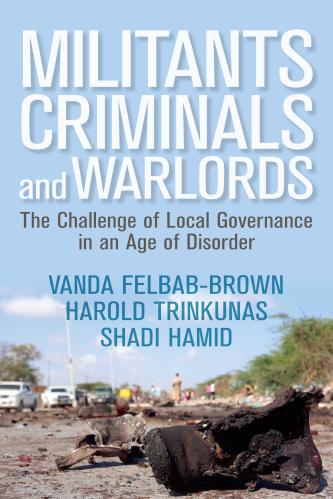
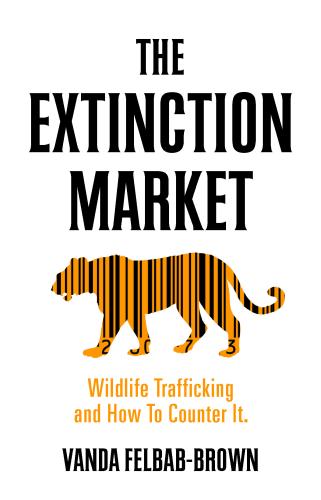
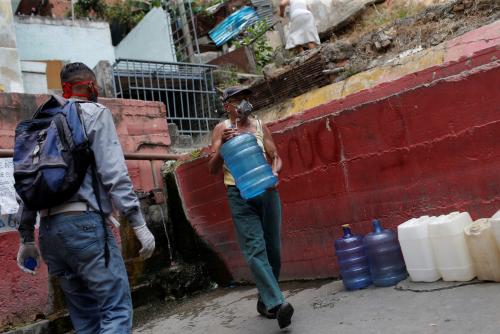
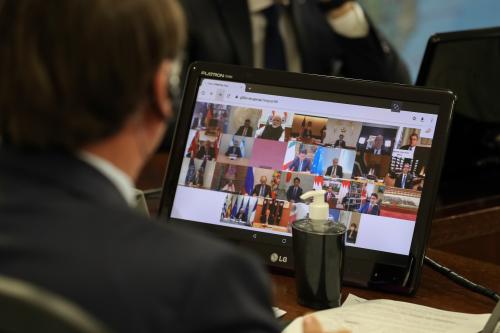
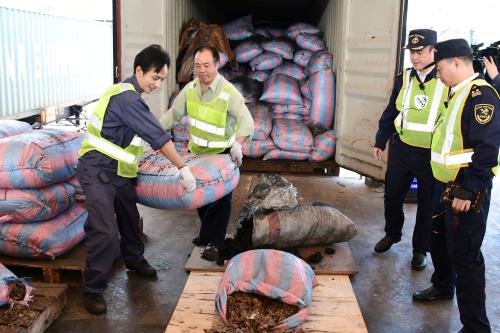


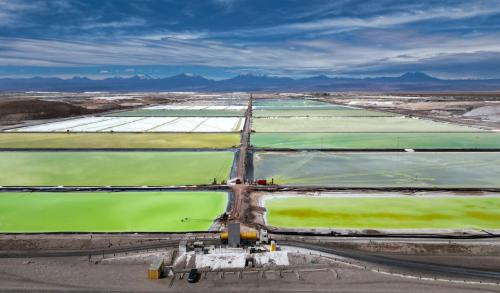
Commentary
How COVID-19 is changing law enforcement practices by police and by criminal groups
April 7, 2020